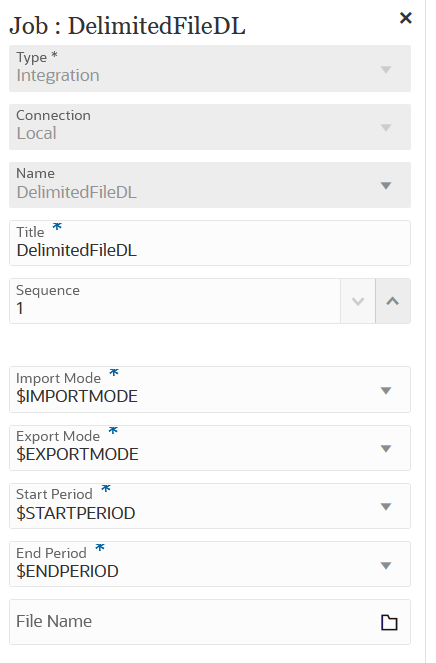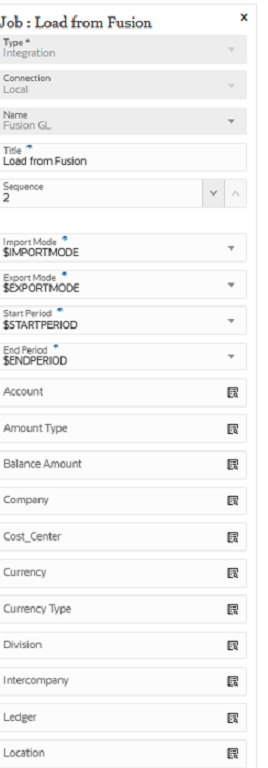Using an Integration Job Type
Use an Integration job type to add and execute or run integrations from the Pipeline. You can add any integration created in Data Integration that extracts metadata and data from an Enterprise Resource Planning (ERP) source system (a direct integration) or data from a file, and then push it to an Oracle Fusion Cloud Enterprise Performance Management target application.
Integration job type parameters include:
Table 12-28 Integration Job Type Parameters
| Integration Job Type Parameter | Description |
|---|---|
| Import Mode |
Optional: From the Import Mode drop-down, select the import mode for the integration job. By default, the $IMPORTMODE parameter uses the value of the variable parameter defined in global variables for the import mode (see Editing Runtime Variables). However, you can select different import modes for different jobs. For example, to load metadata in one integration and just data in another, specify different import modes between the two jobs. |
| Export Mode |
Optional: From the Export Mode drop-down, select the export mode for the integration job. By default, the $EXPORTMODE parameter uses the value of the variable parameter defined in global variables for the export mode (see Editing Runtime Variables). However, you can select different export modes for different jobs. For example, to load metadata in one integration and just data in another, specify different export modes between the two jobs. |
| Start Period |
Optional From the Start Period drop-down, select the Start Period for the integration job. By default, the $STARTPERIOD parameter uses the value of the variable parameters defined in global variables for the start period (see Editing Runtime Variables). However, you can select different start periods for different jobs. For example, if you load metadata in a Pipeline, you can set the Start Period to be BegBalance in the job. |
| End Period |
Optional From the End Period drop-down, select the End Period for the integration job. By default, the $ENDPERIOD parameter uses the value of the variable parameters defined in global variables for the start period (see Editing Runtime Variables). However, you can select different end periods for different jobs. For example, if you load metadata in a Pipeline, you can set the End Period to be EndBalance in the job. |
| File Name |
In File Name, if no file profile has been selected for the integration, specify the file name to use at run time. Click Note: The directory specified here is appended to the directory specified in the integration definition options section. Provide only the directory relative to the directory in the integration definition. For example, if the If a Pipeline job specifies an integration on a remote server, you can specify a file in Pipeline job parameters on the local server, and this file is copied to the remote server and used as the input file for the integration on the remote server. For more information about integration options, see Defining File-Based Options. |
Here are sample job parameters for a file-based Integrations job type:

Here are the sample job parameters for a Load from Fusion integration job type:
